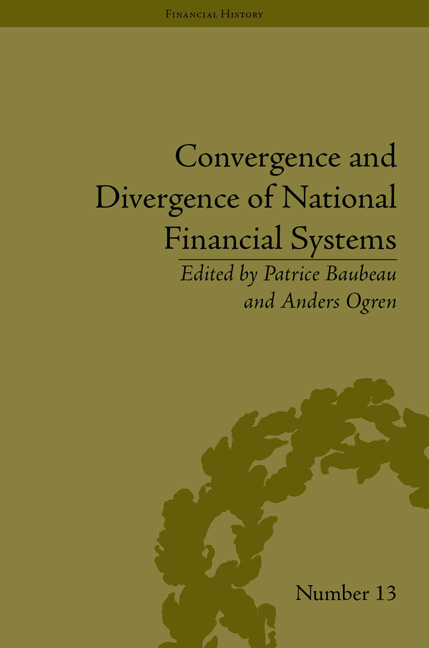 Convergence and Divergence of National Financial Systems
Convergence and Divergence of National Financial Systems Book contents
- Frontmatter
- CONTENTS
- Acknowledgements
- List of Figures
- Introduction
- Part I The Social Mechanisms of Financial Convergence
- 1 Organizations of National Financial Markets and Convergence of Practices: Institutions and Networks of Parisian Brokers in Nineteenth-Century Parisian Financial Markets
- 2 The Resistance of the Lille Marketplace to National Convergence: A Regional Financial System between Autonomy and Sclerosis, 1880–1914
- 3 Competition amongst the French Stock Exchanges during the Second World War
- Part II National Convergences and Divergences in the Long Term
- Part III Convergence and Historical Shocks
- Part IV Convergence and Monetary Constraint
- Notes
- Works Cited
- Index
1 - Organizations of National Financial Markets and Convergence of Practices: Institutions and Networks of Parisian Brokers in Nineteenth-Century Parisian Financial Markets
from Part I - The Social Mechanisms of Financial Convergence
- Frontmatter
- CONTENTS
- Acknowledgements
- List of Figures
- Introduction
- Part I The Social Mechanisms of Financial Convergence
- 1 Organizations of National Financial Markets and Convergence of Practices: Institutions and Networks of Parisian Brokers in Nineteenth-Century Parisian Financial Markets
- 2 The Resistance of the Lille Marketplace to National Convergence: A Regional Financial System between Autonomy and Sclerosis, 1880–1914
- 3 Competition amongst the French Stock Exchanges during the Second World War
- Part II National Convergences and Divergences in the Long Term
- Part III Convergence and Historical Shocks
- Part IV Convergence and Monetary Constraint
- Notes
- Works Cited
- Index
Summary
Contemporaries and historians have always contrasted two modes of organization of the financial market, that of London and that of Paris, as antimonic references – whereas other markets are akin to one of these models or mixes of both. The opposition criterion is the public or private character of the brokers. The London market was labelled as ‘free’, since brokers and jobbers were title merchants without connections to any official function, whereas the stockbrokers of the official French market were ministerial officials appointed by the Finance Minister. Such difference resulted from the political and economic heritage of both countries in the eighteenth and early nineteenth century, since France had been governed by an absolute monarchy which had borrowed a lot, thereby conferring a major role to State rente whereas London was negotiating private securities and foreign funds. During the last quarter of the nineteenth century in France, admiration for the English model and increasing liberalism tended to question the legitimacy of the stockbrokers’ monopoly by diverting the debate towards an opposition between security brought by State-guaranteed monopoly and efficiency on the other hand: the London organization seemed to be the most favourable to business dynamism. It is this debate, leading incidentally to a large number of articles, which gave rise to the Act which recognized and reorganized the coulisse in 1898, an Act which only half-satisfied those standing for liberalism:
Anyway, the controversy seemed to be closed for the time being and the protagonists as a whole were seemingly content with a solution which was nothing but a compromise, whereas any new debate stood little chances, one must admit, to harmonise to any extent. It left to monopoly a territory well-deserved by all the services rendered as well as those it is still providing … Freedom on the other hand was not really banished from the Stock Exchange. Freedom had become firmly established and could deploy its propelling role therein. It acquired, by the way, a guild-like organisation which was a tribute to law and order requirements, which ought to govern any financial market … There was hence certain equilibrium, for a while at least, in Paris between two contradictory conceptions regarding the organisation of the financial markets.
- Type
- Chapter
- Information
- Convergence and Divergence of National Financial SystemsEvidence from the Gold Standards, 1871–1971, pp. 9 - 28Publisher: Pickering & ChattoFirst published in: 2014


